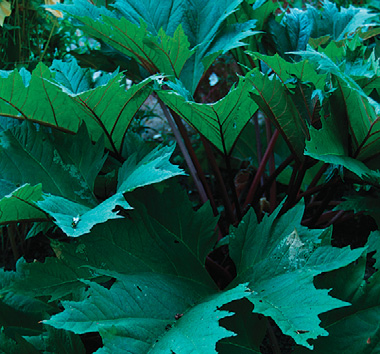
Indian Rhubarb is a perennial shrub growing in the Himalayas at an altitude of 2500–4000m. It is a good remedy for constipation, intestinal diseases and blood toxicity.
Benefits of Rhubarb: Constipation, diarrhea, dysentery, atonic dyspepsia, liver disorders, useful liver cirrhosis, jaundice, acute hepatitis, asthma, respiratory disorders, protects colon tone, cholesterol, bloating, indigestion, abdominal swelling, melaena, cardiac disorders, cough, cold, worms, haematuria, ulcers, mouth ulcers, ulceration of the whole GIT, haematuria, haemorrhoids, bleeding and blood toxicity, fibroids, fights cancer.
Habitat: Himalayas from Kashmir to Sikkim, at altitudes of 3300 -5200 m. Also cultivated in Assam for its leaves consumed as a vegetable.
Action: Purgative, alterative, hemostatic, stomachic, bitter tonic, cathartic, anti-pyretic, anthelmintic.
Scientific name: Rheum emodi.
Useful part: Root.
Dosage: Decotion 1–6ml per day.
Ayurvedic Action
Amanasaka: Destroys toxins.
Pacana: Digests toxins.
Recana: A medium strength laxative.
Krminasaka: Vermifuge.
Gulmanasaka: Removes abdominal tumours and obstructions.
Raktasodhana: Blood purifier.
Energetics
Rasa (taste): Bitter, pungent, astringent
Vırya(energy): Cooling
Vipaka (post-digestive effect): Pungent
Guna (quality): Light, dry, penetrating
Dosa effect: PK−, V+
Dhatu (tissue): Plasma, blood, fat
Srotas (channel): Digestive, excretory, circulatory, reproductive
Classical and common names
Ayurvedic: Amlaparni, Pitamuuli, Gandhini Revatikaa. Revandachini.
English: Indian Rhubarb, Himalayan Rhubarb.
Constituents: The drug contains a number of anthraquinone derivatives-rhein and emodin. Glycosidic active principles sennosides A-F-are present with free anthraquinones. In addition to 0.05 % of an essential oil, roots contain an unidentified terpenic alcohol and a constituent believed to be methyl-n-heptyl ketone. The total oxalic acid content of the leaves and stems are reported to be 0.65 and 0.81 % respectively. Rutin (0.32 %) is present in the leaves and flowers. Eugenol is present in the essential oil.
Preparation: Infusion, powder.
Contraindications: Contraindicated in cases of acute inflammatory intestinal diseases, appendicitis intestinal obstructions, and abdominal pain of unknown origin. Also contraindicated during pregnancy or lactation; gout, rheumatism, in renal disorders.